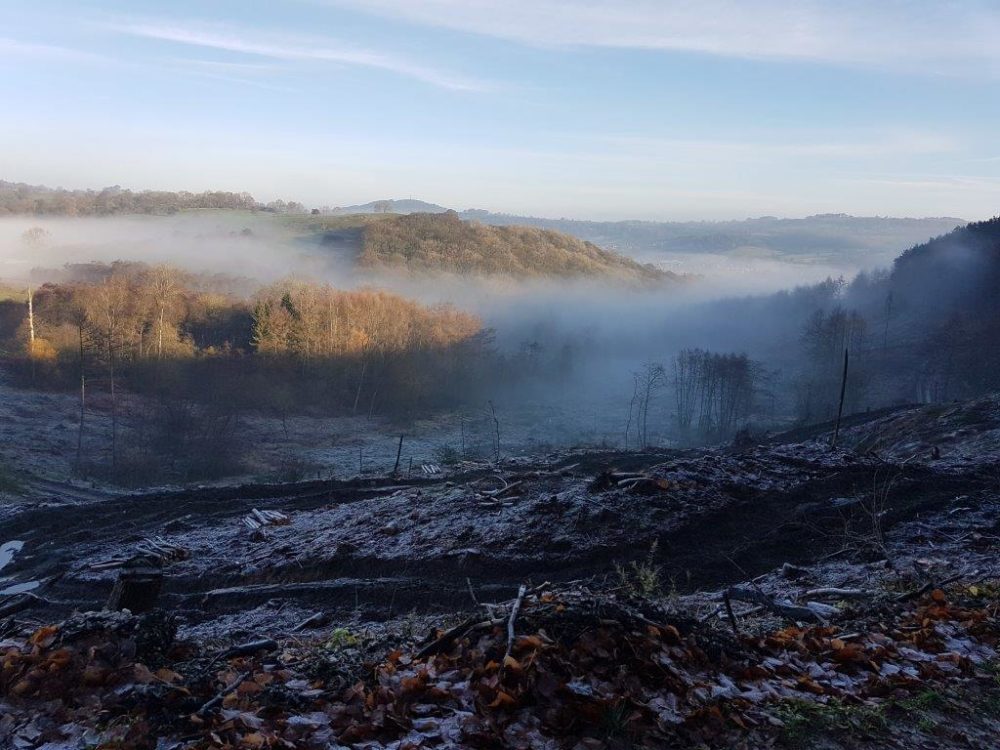Growing Our people: An interview with Niall Duncan, Tilhill Forestry Harvesting Contracts Manager in Aberdeenshire.
“We are encouraged to perform to a high standard at all times, which has helped to develop my skills and knowledge base”
What is your job role within Tilhill Forestry?
I am the Harvesting Contracts Manager in Aberdeenshire and Angus, so am involved in the day to day management of harvesting sites and timber supply as well as working with the Area Timber Buyer to purchase standing sales.
What do you do? Tell us about your typical day?
I am responsible for the day to day management of harvesting sites in the North East of Scotland. The nature of the job is very varied so every day can be different. In any one day I could be doing site visits, pricing the next jobs, speaking to clients and customers.
I need to be able to react quickly to changing site conditions and ensure that high standards are maintained; ensuring that deliveries are maintained to the customers’ requirements and all the time planning the next job to keep our contractors working.
How did you get into harvesting?
During university I spent a mid-year placement with the Forestry Commission in Ludlow, Shropshire. I particularly enjoyed the harvesting work so was keen to continue working in this area after graduating. When I left university I was offered a job in harvesting management in Lochgilphead, Argyll which I took and I worked there for just over 3 years. Since then I have never looked back and I joined the harvesting team at Tilhill Forestry in 2015.
What do you like and not like about working in this industry?
I like that every day is different the most. The harvesting business is a fast paced environment with problems needing to be dealt with quickly. I also like the people I have worked with over the years, who have all been willing to pass on experience and knowledge and help me develop in different ways.
Why did you decide to work for Tilhill Forestry?
I was lucky to be in the right place at the right time when the opportunity to join Tilhill came up. I was looking to progress my career and my partner was based in Inverness. A job with Tilhill Forestry in the Inverness office became available which ticked both boxes. I was happy to join the Company knowing their reputation for quality of work, and also confident of the opportunities that this could lead to.
What do you like most about this company?
One of the biggest strengths are the people I work with. Across the company I am lucky to work with a range of supportive and approachable people with a wealth of skills and experience.
How do you feel Tilhill Forestry contributes to its employees’ professional development?
We are encouraged to perform to a high standard at all times, which has helped to develop my skills and knowledge base. Working as a contracts manager, I report to the Area Harvesting Manager, so I have someone who I can bounce ideas and problem solve with in the area that I’m working.
What sorts of changes are occurring in your occupation?
Harvesting is an ever evolving job. While the process of felling trees has not changed significantly in my time in the industry, the technology has moved on, which allows for greater visibility to the managers of what is happening on site from a distance. The ever moving timber markets also always make the job interesting and challenging.
How does a person progress in your field?
As with most jobs the best way to progress is to work hard and put the effort in. The only way to really progress is to gain the necessary experience and build relationships. As with the whole forest industry there are limited opportunities and there is an element of being in the right place at the right time, so being willing to move for the possibility of promotion is important. I have worked in several different areas of Scotland over the last seven years all with different challenges. This means that there are also always new things to learn.
What is your advice to anyone wishing to pursue harvesting as a career?
The best advice I was given when I started working in forestry straight out of university was to be flexible in my location. My first job in forestry was in harvesting on the west coast and while this was not the best for me personally at the time, it gave me a great opportunity to learn from some good people and work in some very challenging conditions.
A career in harvesting is not for everyone, it takes a certain mind-set and you need to develop a thick skin to deal with the constant shifting conditions and problems that the job has the potential to throw at you.



